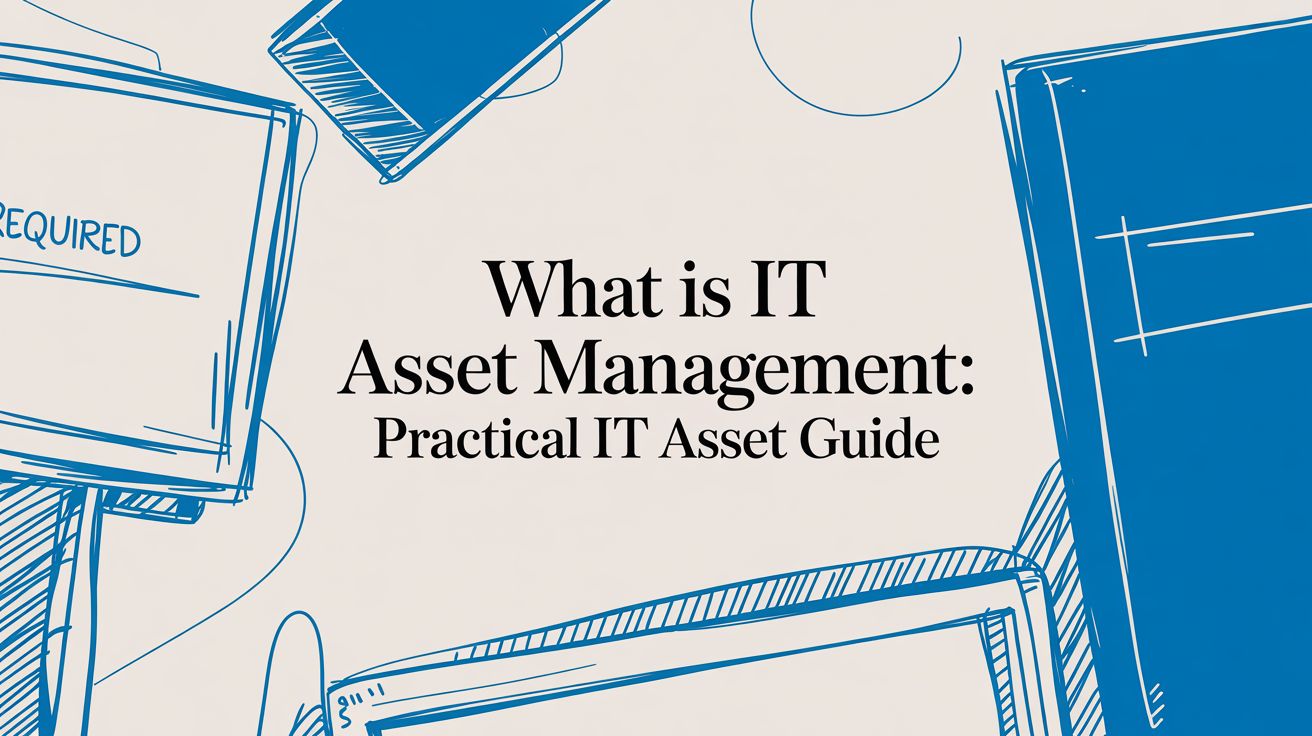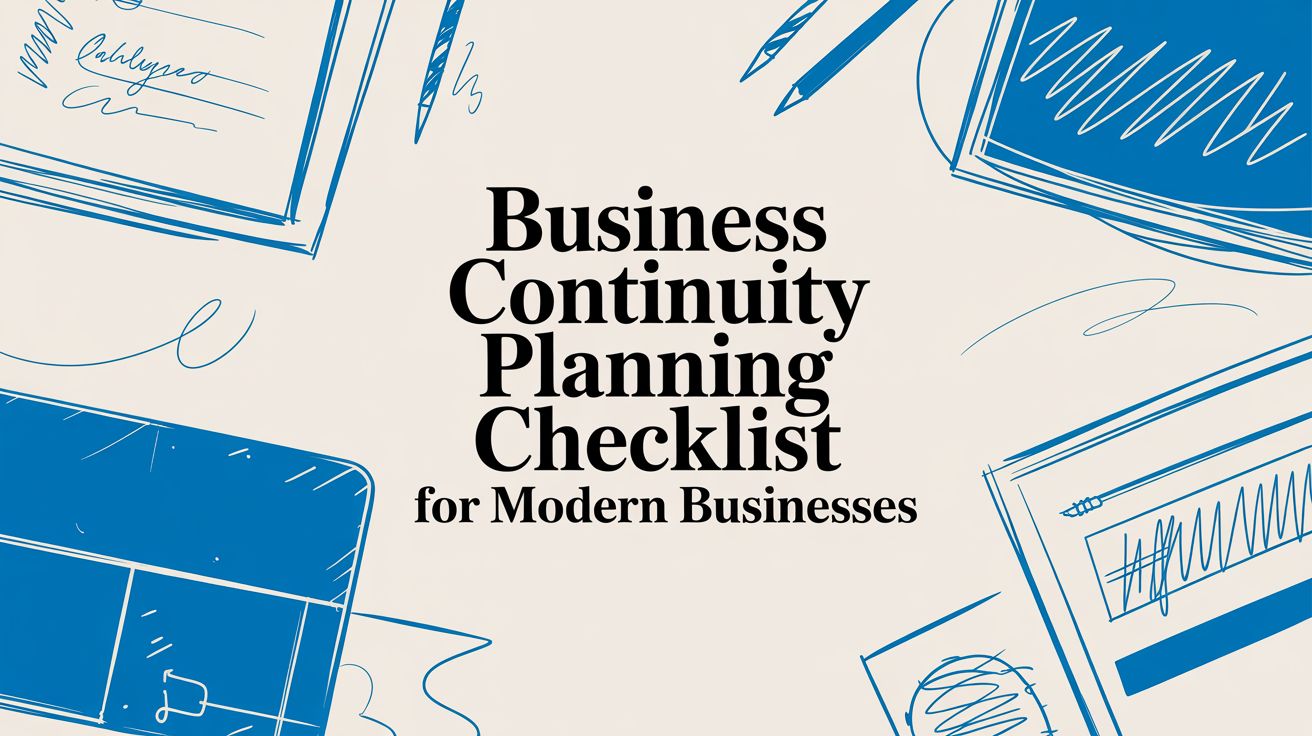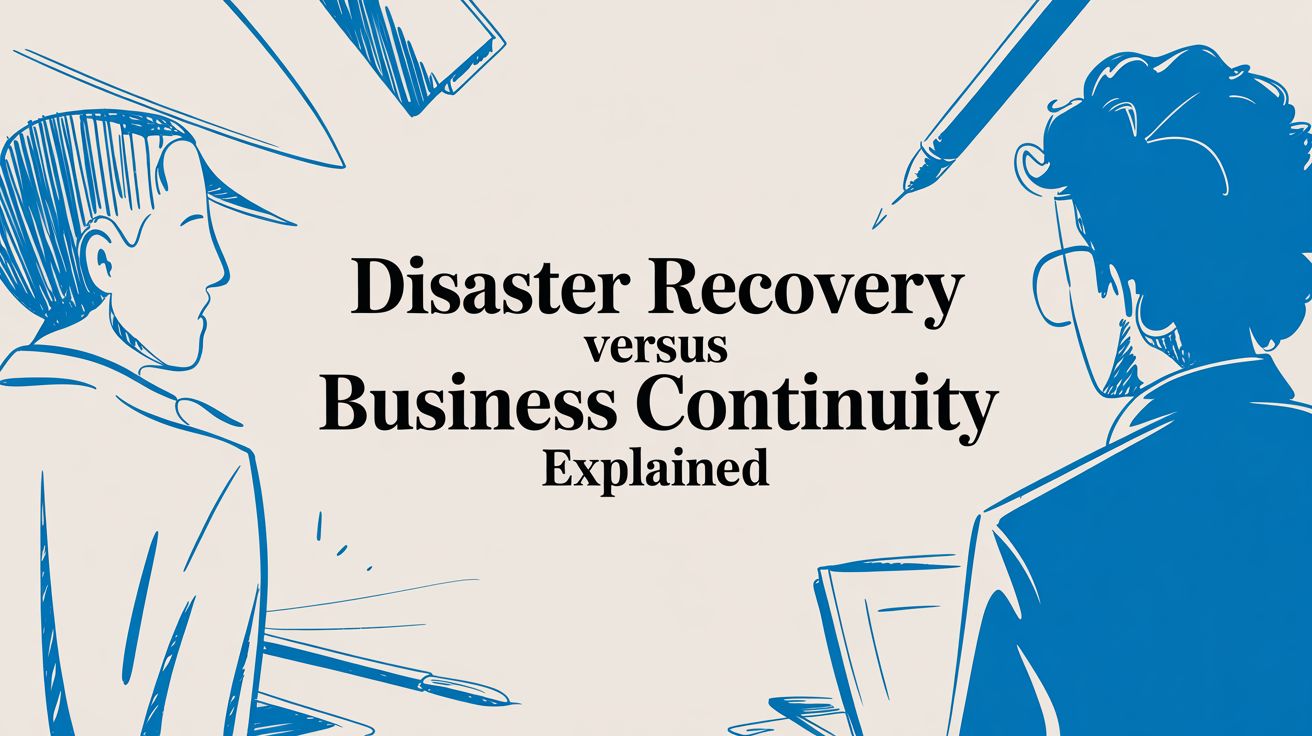Navigating Cybersecurity Compliance: A Guide for SMBs
Think of a cybersecurity compliance service as an expert IT partner who ensures your technology follows the specific rules of your industry. This isn't just about avoiding hefty fines for non-compliance with standards like HIPAA or PCI DSS; it's about building a resilient business that earns and keeps customer trust. A managed IT services provider takes complex regulations and turns them into a practical, day-to-day security plan.
What Is a Cybersecurity Compliance Service?
Imagine trying to build a secure bank vault without a blueprint or a safety inspector. You could probably put up some thick walls, but you'd have no real assurance it could stop a determined thief. A cybersecurity compliance service is both the architect and the inspector for your digital vault—your company's sensitive data. This isn't just about installing antivirus software; it's an ongoing partnership with a dedicated managed IT provider.
These services are all about proactively building and managing your IT systems to meet tough industry mandates. For a medical office, this means aligning with HIPAA to protect patient information. For an online store, it means following PCI DSS to secure credit card transactions. The ultimate goal is to translate dense, legal jargon into a clear, actionable IT security strategy that protects your business.
From Rules to Resilience
At its heart, this service bridges the gap between what regulations require and what your business is actually doing. Many business owners mistakenly view compliance as a simple checklist, but it’s far more strategic. It's about building a fundamentally resilient business that can safeguard critical data, maintain customer confidence, and keep running smoothly. A key piece of this puzzle involves securing all communication channels, including the often-overlooked area of mastering video conferencing security.
A solid compliance strategy isn't a one-and-done project. It involves several ongoing efforts:
- Risk Assessments: Finding your security weaknesses before a hacker does through thorough vulnerability assessments.
- Policy Development: Creating a straightforward IT security playbook for your entire team to follow.
- Continuous Monitoring: Having a 24/7 digital watchdog that flags threats the moment they appear, a core feature of endpoint management.
- Audit Preparation: Making sure you have all the right documentation and controls ready for official inspections.
A Real-World Dallas Example
Let’s look at a small healthcare clinic in Dallas that manages sensitive patient files every single day. Without a formal compliance plan, they're exposed to crippling fines and a reputation-shattering data breach. By partnering with a cybersecurity compliance service, they bring in a managed IT provider who knows the ins and outs of HIPAA.
The provider sets up encrypted email, implements endpoint protection to lock down the network, and conducts security awareness training for the staff on how to handle data safely. When an unexpected HIPAA audit comes around, the clinic is ready. The documentation is organized, the security systems are active, and the team can show they understand the privacy rules. Instead of scrambling in a panic, the clinic passes its audit, strengthening patient trust and proving it takes data protection seriously. This is how compliance stops being a burden and becomes a real business advantage. This proactive partnership is a core function of many IT providers; you can learn more about what managed service providers do in our detailed guide.
Navigating Key Compliance Frameworks for Your Business
The world of compliance often feels like a messy bowl of alphabet soup—HIPAA, PCI DSS, GDPR. But behind each acronym is a critical promise: to protect your customers, your data, and your business. These aren't just arbitrary rules; they are proven blueprints for building and maintaining trust through effective IT security.
This isn't just a "nice-to-have" anymore. The global cybersecurity market, which includes these compliance services, is on track to hit over $421 billion by 2032. This explosive growth is a direct response to a surge in cyber threats and tightening data privacy rules. For any business, this means the pressure to get compliance right is only going to intensify.
Unpacking the Most Common Frameworks
Think of a compliance framework like a building code. A contractor follows specific codes to make sure a house is structurally sound and safe for its inhabitants. In the same way, your business follows a compliance framework to ensure the data you handle is secure and your customers are protected.
Here are the big ones you'll likely encounter:
- HIPAA (Health Insurance Portability and Accountability Act): If you're anywhere near the healthcare space—from a small medical practice to a third-party billing service—HIPAA is the law of the land. It’s all about protecting patient privacy and ensuring their sensitive health information stays confidential.
- PCI DSS (Payment Card Industry Data Security Standard): Do you accept credit cards? If you process, store, or transmit cardholder information, PCI DSS is your rulebook. It provides a set of security standards designed to keep every single transaction safe and prevent costly data breaches.
- GDPR (General Data Protection Regulation): Don't let its European Union origins fool you; GDPR has a long reach. If your business markets to or handles the personal data of anyone in the EU, you need to follow its strict rules on privacy and consent. It's built on the fundamental principle of respecting an individual's right to control their own data.
This infographic lays out a simple path for figuring out when and how to get help with these complex requirements.
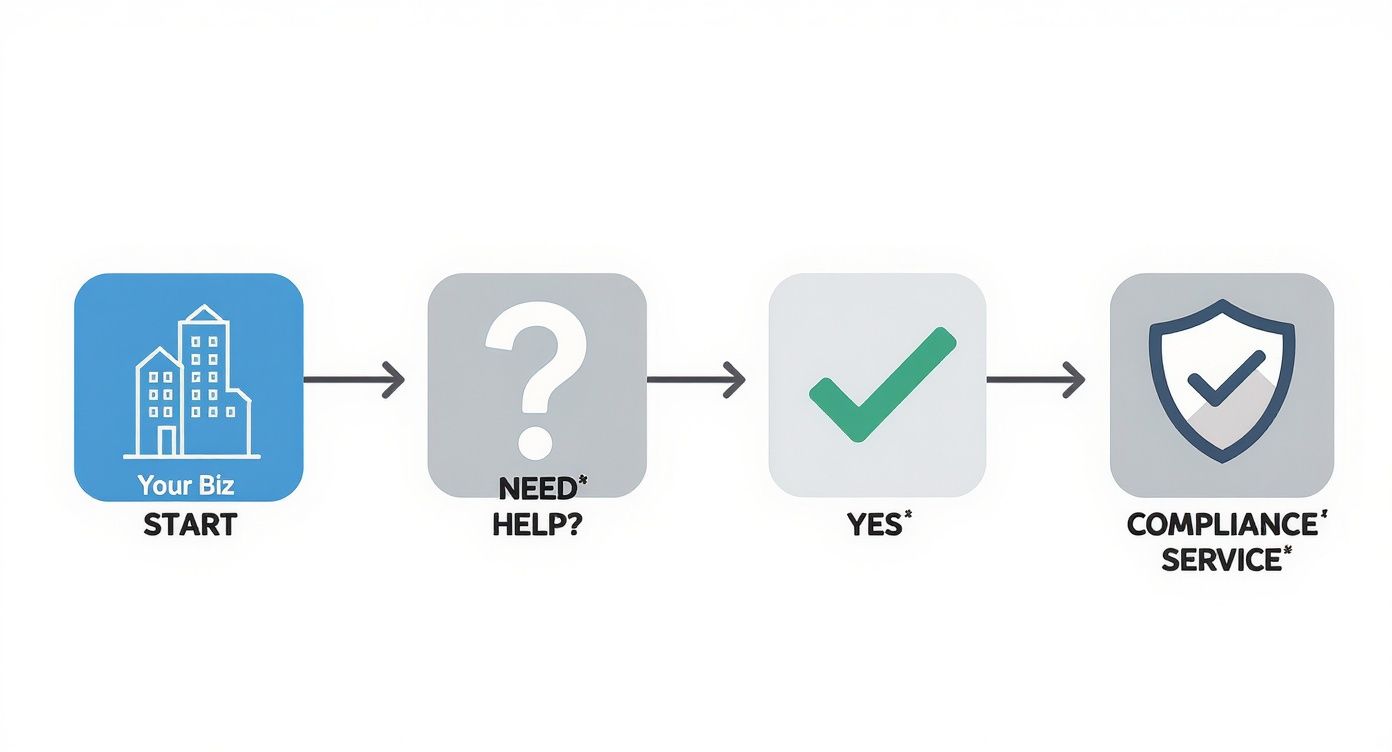
As you can see, the journey often starts with recognizing you need a guide. That's where a cybersecurity compliance service comes in, helping you build a secure IT foundation from the ground up.
Which Regulations Apply to Your Business?
Figuring out which framework applies to you can feel like a puzzle, especially if your operations touch multiple areas. A small financial advisory firm, for instance, might process client payments (hello, PCI DSS) while also handling sensitive financial data that falls under other industry-specific regulations.
The trick is to map your daily business activities to the kinds of data you collect and manage. If you need to go deeper on this, our guide on data security compliance offers valuable insights into building a strategy that fits your unique needs.
A Practical Example: A multi-family property management company handles tenant applications with social security numbers and lets residents pay rent online. This means they are responsible for protecting personal information and must follow PCI DSS for their payment system. A compliance service would help them secure both their network and their payment portal with layered security, including firewalls and endpoint management, to meet these different but equally important rules.
To make things a bit clearer, here’s a quick-reference table that connects common business sectors to the frameworks that usually apply to them.
Common Compliance Frameworks by Industry
This table can help you quickly pinpoint which regulations are most likely relevant to your line of work.
Ultimately, getting a handle on these frameworks is the first step. It transforms compliance from a vague, stressful obligation into a clear business advantage, allowing you to understand your responsibilities and protect yourself from the very real financial and reputational risks of getting it wrong.
The Core Services That Keep Your Business Compliant
Okay, you know you need help with cybersecurity compliance, but what does that partnership actually look like day-to-day? This isn’t about installing a piece of software and walking away. It's a collection of active, ongoing managed IT services that build and maintain a strong defensive wall around your business.
Think of each service as a different layer of your IT security. They all work together to keep your operations safe and, just as importantly, in line with the rules of your industry. These services are what turn vague regulatory requirements into concrete actions that protect your data and prove to auditors you're doing things right.
Let's break down the essential pieces.
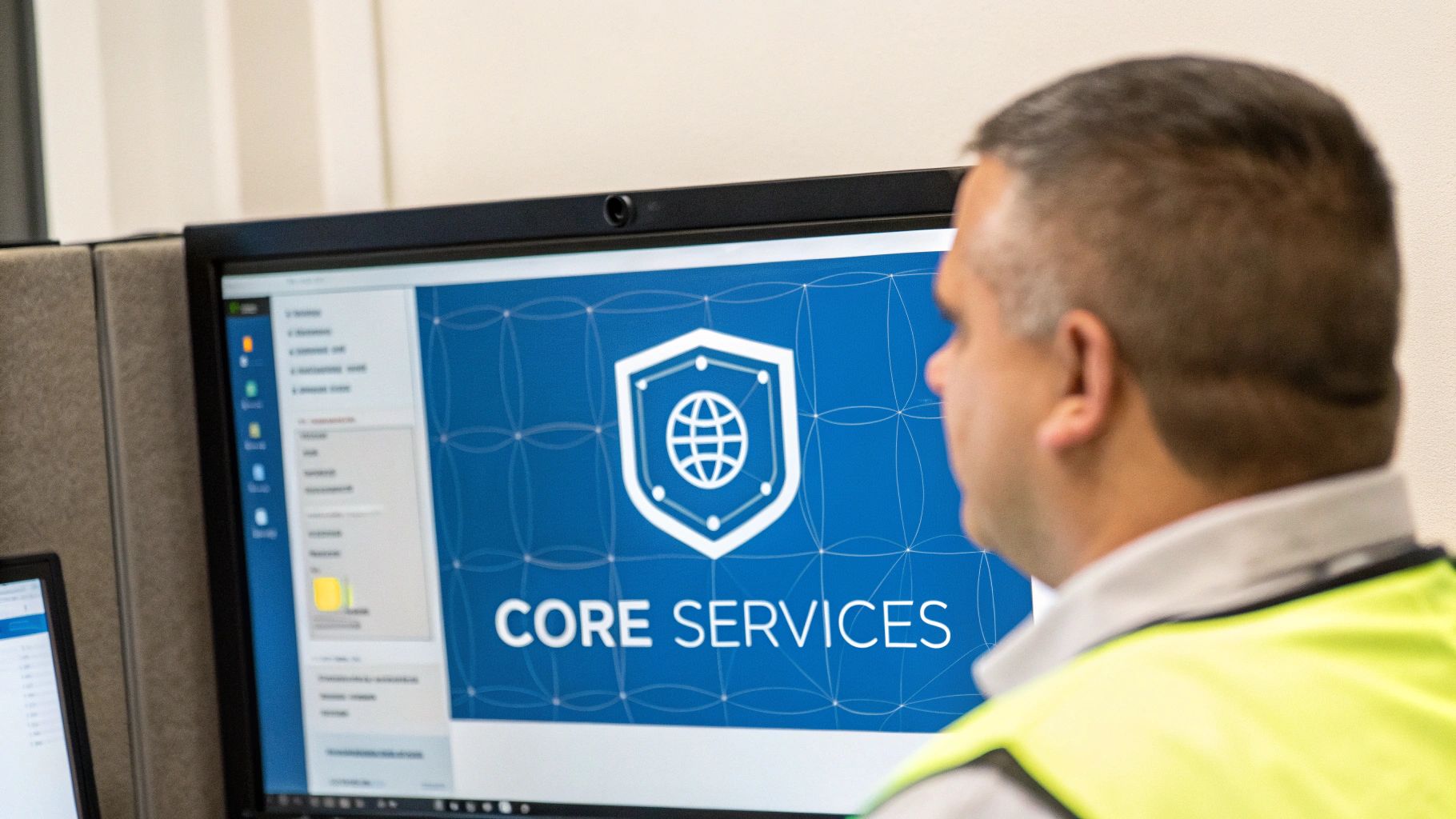
Comprehensive Risk Assessments
You can't protect what you don't know is vulnerable. A risk assessment is like hiring a professional inspector to go through your house, checking every lock, window, and blind spot to find weaknesses before a burglar does.
In the digital world, this means a deep dive into your network, systems, and daily processes to spot security gaps. Your managed IT partner will analyze everything from outdated software and weak password rules to how your team stores sensitive files. The final product is a straightforward, prioritized roadmap that shows you exactly what to fix first and why.
Strategic Policy and Procedure Development
Once you know your risks, you need a simple rulebook for your team. That’s what policy and procedure development is all about—creating clear, easy-to-follow guidelines for how your company handles its technology and data.
This isn’t about writing a 100-page manual that gathers dust on a shelf. It’s about creating practical documents that answer critical questions in plain English:
- Acceptable Use Policy: What are the ground rules for using company laptops and the internet?
- Data Handling Policy: How exactly should our team store, share, and delete client information?
- Incident Response Plan: If we suspect a breach, what are the first five steps we take, and who do we call?
Clear policies take the guesswork out of IT security, ensuring everyone is on the same page and understands their role in protecting the company.
Employee Security Awareness Training
Your employees are either your biggest security risk or your strongest line of defense. The difference is almost always training. A good cybersecurity compliance service includes regular security awareness training that gives your team the skills to spot and sidestep modern cyber threats like phishing.
Key Insight: Technology alone can't stop every threat. A well-trained employee who can recognize a sophisticated phishing email is often more effective than the most advanced firewall. This human element is a critical piece of any robust IT security strategy.
This is more than just a boring annual presentation. Effective training involves engaging exercises like simulated phishing attacks, which test how your team responds in a safe, controlled environment. By teaching them to identify malicious links and social engineering tricks, you turn potential victims into active defenders, strengthening your organizational security culture.
Continuous Monitoring and Threat Detection
Cyber threats don't stick to a 9-to-5 schedule, so your security can't either. Continuous monitoring is like having a digital watchdog that never sleeps, constantly scanning your network for anything out of the ordinary. It uses smart tools like EDR/MDR solutions to spot anomalies—like a login from an unusual location or a sudden large data transfer—that could signal an attack.
This proactive watchfulness is key to stopping attacks before they cause real damage. Instead of discovering a breach weeks later, you get real-time alerts that allow for an immediate response. Many providers offer this as part of a broader security package. To see how it all fits together, check out our guide on what is included in managed security services.
Client Scenario: A Memphis Logistics Company Under Attack
Picture a mid-sized logistics company in Memphis that runs 24/7. Their servers manage everything from shipping schedules to sensitive client data. One night at 2 AM, their monitoring system flagged an unusual encryption process kicking off on a core server.
The system automatically isolated that server from the network, stopping the ransomware attack cold before it could spread. The on-call security team was alerted instantly. By the time the morning shift walked in, the threat was neutralized and the server was already being restored from a clean backup, thanks to a robust data backup and disaster recovery plan.
What could have been a business-crippling disaster was reduced to a minor, contained hiccup with zero downtime and no data lost. That’s the real-world value of a 24/7 cybersecurity compliance service.
How Proactive Compliance Becomes a Competitive Advantage
https://www.youtube.com/embed/VOniW5j_hzw
For a lot of business owners, compliance can feel like a grudge purchase—just another expensive box you have to tick to stay out of trouble. But what if that’s the wrong way to look at it? Shifting your perspective can turn compliance from a cost center into one of your most powerful tools for growth.
Instead of seeing it as a defensive move, think of it as an investment in your company's reputation and business continuity. When you can show the world that you take data protection seriously, you build a foundation of trust with customers, partners, and investors. That trust is what turns one-time buyers into loyal clients and gives you a real edge in a crowded market.
Building Trust Through Verified Security
Data breaches are in the news constantly, and customers are getting smarter about who they do business with. They’re actively looking for companies that will respect and protect their information. Having a verifiable compliance standard, like HIPAA for a healthcare practice or PCI DSS for an e-commerce store, acts as a stamp of approval.
It’s a clear signal to everyone that you’ve done the hard work to safeguard their data. This isn't just a promise you make in your marketing materials; it's a commitment backed by strict, provable standards. Your IT security suddenly becomes one of your best selling points.
Client Success Story: Dallas Financial Advisory Firm
A growing financial advisory firm in Dallas was in the running for a huge corporate contract. The competition was fierce, but they had an ace up their sleeve. Throughout the entire proposal process, they emphasized their meticulously documented data protection program, managed by their cybersecurity compliance service partner. They didn't just say they were secure; they had the risk assessments and policies to prove it. This verifiable commitment to security was the tiebreaker that helped them land the contract over their bigger, more established rivals.
Enhancing Operational Efficiency
A solid compliance framework does more than just lock down your data—it actually makes your business run smoother. When you have clear, documented procedures for handling information, managing who has access to what, and responding to incidents, you cut out the guesswork and minimize human error.
This clarity brings a surprising boost to your team's efficiency. People stop wasting time with chaotic workflows or second-guessing security protocols. Instead, they can focus on what they do best: taking care of customers and moving the business forward. Compliance, when done right, creates a more organized and resilient company from the inside out.
Gaining a Strategic Edge
At the end of the day, a strong compliance posture is a strategic asset. It can be your ticket to entering new markets, landing bigger clients, and setting your brand apart. Many large corporations and government agencies won't even consider working with a company that can't prove it meets specific IT security standards.
The numbers back this up. The entire Governance, Risk, and Compliance (GRC) market, which cybersecurity compliance is part of, is valued somewhere between $50 to $100 billion. What's more, a full 69% of firms view compliance reports as critically important, which shows you where their priorities lie. You can discover more insights about cybersecurity compliance trends on BrightDefense.com. Being proactive about compliance simply opens doors that would otherwise be locked.
Putting money into a cybersecurity compliance service isn't just about following the rules. It's about building a stronger, more trustworthy, and more efficient business that’s ready for the long haul. If you want to understand how this kind of partnership works, our article on the benefits of IT managed services provides additional context on this partnership.
Choosing the Right Cybersecurity Compliance Partner
Picking a partner to handle your cybersecurity compliance is a huge decision. It's one that will echo through your company’s security, reputation, and even its ability to grow. You’re not just hiring another vendor; you’re looking for a strategic ally who will operate as a genuine extension of your team.
Get this right, and compliance becomes an asset. Get it wrong, and you could be left frustrated, exposed, and dealing with the fallout of a data breach.
The real goal is to find a managed IT services provider who gets you out of the break-fix cycle. You need a team that’s always looking ahead—anticipating regulatory updates, spotting risks before they blow up, and constantly refining your security. That forward-thinking, proactive IT management mindset is what separates a true compliance specialist from a basic IT provider.

Key Questions to Ask Potential Providers
To really figure out if a provider is the right fit, you have to ask the tough questions. It's about getting past the slick sales pitch to understand how they actually work. A provider who can answer these questions with confidence and detail is one you can likely trust.
Here's where to start:
- Do you have proven experience with our industry’s regulations? A partner who knows HIPAA inside and out is invaluable for a medical clinic. Likewise, a retail business needs someone fluent in PCI DSS. This specific expertise prevents rookie mistakes and saves a ton of time.
- Can you provide relevant case studies or client references? Nothing speaks louder than results. Seeing how they’ve helped businesses like yours is the best proof you’ll get of their ability to deliver real business outcomes.
- What does your reporting look like? Ask to see a sample report. Is it clear and easy to grasp, or is it a wall of technical jargon? Good reports should tell you exactly where you stand on your compliance goals, no decoder ring required.
- How do you handle audit support? When the auditors come calling, you want a partner in your corner. A great provider will be right there with you, supplying the documentation and evidence needed to make the process as painless as possible.
Look for Proactive Management, Not Reactive Fixes
One of the biggest differentiators comes down to philosophy. Is the provider reactive or proactive? A reactive company waits for an alert, a breach, or an audit notice before they jump into action.
A proactive cybersecurity compliance service works to make sure those emergencies never happen in the first place.
The Proactive Difference: A proactive partner delivers a strategy, not just a box of software. They’re running regular risk assessments, keeping your employees trained on the latest threats, and constantly monitoring your network to ensure compliance is a continuous state, not a one-time project. This is the core of managed IT services.
Think of it this way: it’s the difference between a security guard who only shows up after the alarm has been tripped and one who patrols the perimeter 24/7, actively looking for trouble.
The Value of a Local Partner
For businesses in Dallas, TX, and Memphis, TN, there's a clear advantage to working with someone local. A local team understands the regional business environment and can be on-site quickly when a remote fix just won't cut it.
That physical presence adds a layer of accountability and personal service that a faceless national provider often can't match, whether you need professional IT services for a project or ongoing network support.
Making an informed choice here is one of the most critical security decisions you'll make. Use these points as your guide to find a partner who won’t just protect your business, but will actively help it succeed.
Answering Your Top Compliance Questions
Even after laying out a strategy, it's completely normal for small and mid-sized business owners to have lingering questions about cybersecurity compliance. Let's be honest—it's a world filled with dense regulations and technical jargon. Feeling a bit uncertain is part of the process.
This section is all about cutting through that complexity. We'll tackle the most common questions we hear from business owners just like you, providing straight-up, practical answers to help you move forward with confidence. Think of this as turning those compliance challenges into genuine business strengths.
My Business Is Small. Do I Really Need This?
This is, without a doubt, the number one question we get. The answer is an emphatic yes. The old idea that cybercriminals only go after big corporations is long gone. In reality, they often see smaller businesses as prime targets precisely because they assume security is an afterthought. A 2023 report drove this home, showing that a staggering 43% of cyberattacks are aimed directly at small businesses.
On top of that, regulations like HIPAA or PCI DSS don't care about the size of your company. If you handle patient health records or take credit card payments, the same rules apply to you as they do to a Fortune 500 company. The fallout from a breach—crippling fines, legal battles, and a shattered reputation—can easily sink a small business. Proactive compliance isn't just a good idea; it's your best defense.
What Is a Realistic Budget for a Compliance Service?
There's no simple, one-size-fits-all price tag for a cybersecurity compliance service. The cost really hinges on a few key things specific to your business:
- Your Industry: A healthcare clinic navigating HIPAA will have far more complex—and therefore more expensive—needs than a local retail shop just focused on PCI DSS.
- The Data You Handle: The more sensitive information you store, process, or transmit, the more security and compliance muscle you're going to need.
- Your Current IT Setup: If your technology is a few years behind, there might be higher initial costs to get your systems up to snuff before the ongoing management kicks in.
Key Takeaway: Stop thinking of compliance as a cost. It's an investment in protecting your business from disaster. The price of a proactive service is almost always a tiny fraction of what a single data breach would cost you—an average of millions for small businesses.
Most Managed IT Service Providers roll compliance into a predictable, fixed monthly fee. This approach gives you access to enterprise-level security and expert guidance without the sticker shock of unexpected bills, making it a perfect fit for a small business budget.
How Long Does It Take to Become Compliant?
Getting compliant is a journey, not a destination you arrive at overnight. The timeline to align with a standard like HIPAA or NIST really depends on your starting point. If you're building from the ground up with very few controls in place, the initial phase of assessments, policy writing, and system upgrades could take several months.
But the goal isn't just to check a box once; it's to stay compliant. For a clear look at the essential first steps, our small business cybersecurity checklist is a great place to start: https://www.pwrtechnologies.com/blog/small-business-cybersecurity-checklist
A good IT partner will tackle the biggest risks first to immediately lower your exposure, then work methodically through the rest of the requirements. They'll also set up continuous monitoring to make sure you remain compliant as regulations shift and your business grows. For a real-world look at how companies handle these duties, you can review a company's privacy policy and see how they communicate their commitment to data protection. It’s a great example of how compliance becomes an ongoing part of the business.
Ultimately, the smartest way to handle these questions is by working with a cybersecurity compliance service. An expert partner doesn't just give you the tools; they provide the strategic guidance you need to build a secure, resilient business poised for success.
Ready to turn compliance from a hurdle into a competitive advantage? The team at PWR Technologies specializes in creating and managing robust compliance programs for businesses in Dallas and Memphis. Contact us today for a consultation and build a more secure future.


